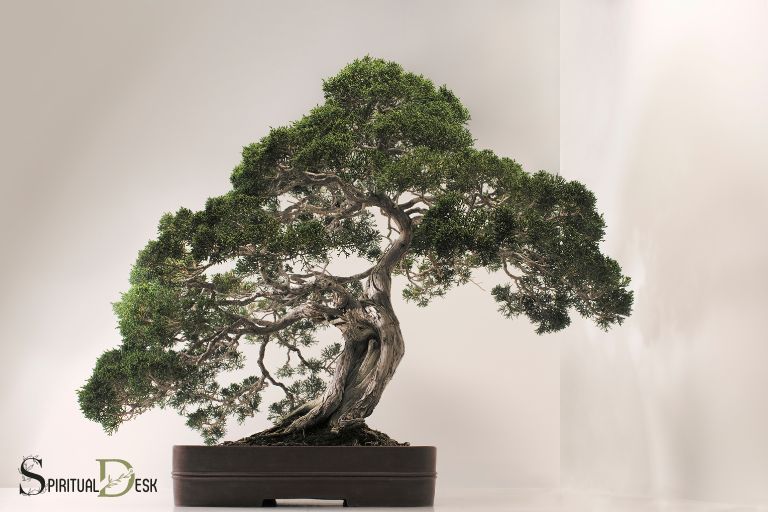What is the Spiritual Meaning of a Bonsai Tree? Peace!
The spiritual meaning of a Bonsai tree is deeply rooted in the practice of Zen Buddhism. The Bonsai tree symbolizes harmony, peace, balance, and all that is good in nature.
It represents a union of the human soul with the universe, embodying wisdom, patience, and a profound bond to nature’s inherent beauty.
The Bonsai tree’s spiritual significance is traced back to the Japanese and Chinese cultures where it originated.
The art of growing these miniature trees is often seen as a spiritual experience, emphasizing balance, simplicity, and the beauty of the natural world.
Both Zen Buddhism and Taoism principles are deeply reflected in the care and cultivation of Bonsai trees, promoting inner peace and tranquility.
Bonsai trees are more than just miniature plants, they are a spiritual symbol imbued with profound philosophical and cultural meanings.
The act of nurturing and shaping a Bonsai involves inner peace, patience, balance, and a deep appreciation for nature’s innate beauty.
Through this practice, one can achieve a greater understanding and connection to the universe, reflecting the key principles of Zen Buddhism.
7 Aspects: Spiritual Meaning of a Bonsai Tree
| Aspect | Spiritual Meaning |
|---|---|
| Size | A bonsai tree’s small size represents the vastness of the universe contained within a limited space. It serves as a reminder that we can find beauty and inspiration in even the smallest things around us. |
| Shape | The shape of a bonsai tree symbolizes the balance and harmony found in nature. Its carefully crafted form represents the interconnectedness of all living things and our role in maintaining that balance. |
| Growth | The slow and deliberate growth of a bonsai tree represents the cultivation of patience, discipline, and persistence. It serves as a reminder that true growth and transformation take time and effort. |
| Care | The meticulous care required for a bonsai tree symbolizes the importance of nurturing and tending to our own spiritual growth. It reminds us to cultivate mindfulness and self-awareness in our daily lives. |
| Pruning | The act of pruning a bonsai tree represents the process of letting go of unnecessary thoughts, attachments, and emotions in our lives. It serves as a metaphor for personal growth and self-improvement. |
| Roots | The exposed roots of a bonsai tree symbolize our connection to the earth and our grounding in the present moment. They remind us to stay humble and grounded in our spiritual journey. |
| Balance | The balance of a bonsai tree, between its foliage and roots, represents the equilibrium between our inner and outer lives. It serves as a reminder to maintain a balanced approach to our spiritual and material pursuits. |
Key Takeaway

Five Facts About the Spiritual Meaning of a Bonsai Tree
Is Bonsai A Spiritual?
No, bonsai is not spiritual. While the practice of bonsai can be seen as a form of meditation or mindfulness, it is not a spiritual practice. Bonsai is an ancient art form that originated in China and was later adopted by the Japanese.
The word “bonsai” actually means “tray planting” in Japanese. The goal of bonsai is to create miniature trees that resemble full-size trees found in nature.
This is done through careful pruning and training of the tree over many years. While bonsai can be seen as a symbol of harmony and balance, it is not a spiritual practice.
Do Bonsai Trees Represent Good Luck?
Bonsai trees have been around for centuries and are believed to bring good luck in many cultures. The word �bonsai� is actually Japanese for �tray planting� and these miniature trees are grown in small pots or trays.
Bonsai trees can be found in a variety of shapes and sizes, but they all represent the same thing: a symbol of harmony between man and nature. The tradition of growing bonsai began in China over 1,000 years ago before spreading to Japan.
In both cultures, bonsai trees were seen as symbols of good luck because they represented the harmony between humans and nature. Today, bonsai trees are still considered to be lucky symbols by many people around the world. If you�re looking for a way to add some good luck to your life, consider getting a bonsai tree!
Bonsai Tree Meaning Love
Bonsai trees have been around for centuries and are a popular symbol of love. The word bonsai is Japanese for “tray planting” and these miniature trees are often seen as a sign of affection. The bonsai tree meaning love can be traced back to the 14th century when they were first introduced to Japan from China.
These tiny trees quickly became a popular gift between lovers and their popularity has only grown since then. There are many different types of bonsai trees, but the most common is the Ficus variety. This species of tree is known for its strong roots and ability to thrive in small spaces.
The bonsai tree meaning love is about more than just the physical appearance of these beautiful plants. It also represents the strength and endurance of your relationship. Bonsai trees require regular care and attention, which is a perfect analogy for any healthy relationship.
Whether you’re looking for a unique gift for your significant other or simply want to add a special touch to your home d�cor, a bonsai tree is a beautiful way to show your loved ones how much you care.
Bonsai Tree Superstition
Bonsai trees are often associated with good luck and fortune. This is because the bonsai tree symbolizes strength, perseverance, and harmony. The bonsai tree has been known to bring good luck to those who own them.
It is believed that the bonsai tree can help you achieve your goals and dreams. If you have a bonsai tree, it is said that you will be blessed with a long life, good health, and happiness.
Bonsai Tree Meaning In Feng Shui
Bonsai trees are often used in Feng Shui because of their meaning. Bonsai trees represent the balance of nature, and they are said to bring good luck and fortune. The word �bonsai� actually means �tray planting� in Japanese.
Bonsai trees are usually planted in small pots or trays, which represents the limited space that they have to grow. This symbolizes the fragility of life and how we must cherish every moment.Bonsai trees are said to promote harmony and balance in our lives.
They can be used to create a peaceful and serene environment, which is perfect for relaxation and meditation. If you place a bonsai tree in your home, it is believed to bring positive energy into your space. It is also said that bonsai trees can help purify the air and improve your overall health.
Original Meaning Of Bonsai
Bonsai is a Japanese art form using trees grown in containers. The word bonsai is often used in English as an umbrella term for all miniature trees in containers or pots. However, the original meaning of bonsai is �tray planting.�
This refers to the practice of growing plants on trays, shelves, or shallow bowls. The history of bonsai can be traced back to the 6th century CE when Buddhist monks brought tree seedlings and cuttings from China to Japan. These early plantings were likely intended for outdoor use as part of monastery gardens.
Over time, the Japanese developed their own unique style of bonsai cultivation and began keeping trees indoors. By the 14th century, there was a well-established tradition of growing miniature potted trees in Japan.
Bonsai did not become widely known outside of Asia until the late 19th century when Japanese diplomats and trade delegates began bringing these living works of art to exhibitions in Europe and North America.
Since then, bonsai has become an increasingly popular hobby around the world. Today, there are many different styles of bonsai cultivation, ranging from traditional Japanese methods to more modern approaches influenced by Western horticulture practices.
Bonsai Tree Benefits
Bonsai trees are not only aesthetically pleasing, but they offer a number of benefits to both indoor and outdoor spaces. Here are just a few of the benefits that bonsai trees can provide:
Bonsai Tree Meaning in Hindi
Bonsai trees have been around for centuries and are a popular type of plant in many cultures. The word �bonsai� actually comes from the Japanese word �bon,� meaning tray or pot, and �sai,� meaning plant. Bonsai trees are typically created by growing a tree in a small pot or container.
This restricts the roots and keeps the tree small, creating the miniature appearance that is characteristic of bonsais. While bonsais can be created from almost any type of tree, there are some species that are more commonly used in bonsai cultivation. These include maples, junipers, pines, and elms.
Bonsai trees can be either indoor or outdoor plants; however, those grown outdoors must be brought inside during the winter months to protect them from the cold weather. The art of bonsai dates back thousands of years to China where it was originally called �pun-sai.�
It is thought that Buddhist monks brought the art form to Japan during the sixth century A.D., where it quickly gained popularity. Today, bonsais are enjoyed all over the world and can be found in both public and private collections.
Chinese Elm Bonsai Tree Meaning
The Chinese Elm Bonsai tree is a popular choice for those looking to add an elegant touch to their home or office. But what does this beautiful tree represent? According to Chinese mythology, the elm tree is a symbol of strength and endurance.
It was said that the first elm tree grew from a seed that fell from heaven during the time of the gods. The elm was seen as a gift from the gods and was believed to possess special powers. The Chinese Elm is also associated with good luck and fortune.
It is often given as a gift to new businesses or couples starting out in life. The elm is seen as a sign of long life and good health, making it the perfect gift for weddings and anniversaries.
How Can Bonsai Trees Aid in Communication and Peace?
Bonsai trees have held a significant place in Japanese culture for centuries, symbolizing harmony, balance, and tranquility. Their presence can foster a sense of calm and connection, facilitating open communication and understanding. In many Eastern traditions, bonsai trees are also associated with the spiritual meaning of emerald, representing growth, renewal, and harmony.
Types of Bonsai Trees
Bonsai trees are an ancient art form that originated in Asia. The word �bonsai� actually means �tray planting� in Japanese. Bonsai trees are created by growing a tree in a small pot or tray and training it to grow into a certain shape.
There are many different types of bonsai trees, and each type has its own unique appearance and requirements for care. Some of the most popular types of bonsai trees include the following:
Conclusion
The bonsai tree is a symbol of balance and harmony. It is also a symbol of strength and perseverance. The bonsai tree has been used for centuries as a meditation tool. The bonsai tree represents the unity of all things.






